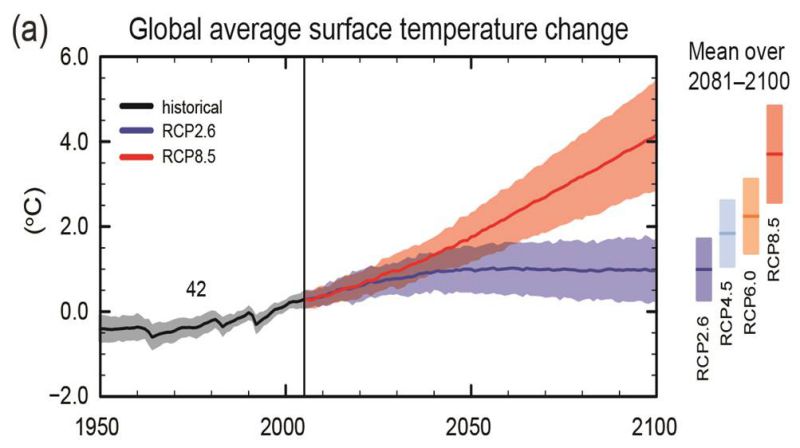Warming Seas
Projections of Changes in Sea-Surface Temperature (SST)
Human activities, such as the burning of fossil fuels, cement production, and deforestation, have increased greenhouse gas concentrations in our atmosphere. The accumulation of carbon dioxide and other heat-trapping gasses has increased atmospheric temperatures, warming the Earth ~0.9°C since 1880, and projected to further warm it between 2-4°C by 2100, mostly due to human activity. ref This increase has led to a corresponding increase in ocean temperatures, particularly in the surface of the ocean. Warmer oceans may also lead to more powerful storms and increases in sea level, which can dramatically affect coral reef ecosystems.

Global average surface temperature change from 1950 to 2100. Measure of uncertainty (shading) and projections are shown for scenarios RCP2.6 (blue) and RCP8.5 (red). Image © IPCC 2013
Impacts on Coral Reef Ecosystems
Corals can tolerate a narrow range of environmental conditions and live near the upper limit of their thermal tolerance. Therefore, corals are very sensitive to changes in sea temperature. Abnormally high ocean temperatures (e.g., sea temperatures 1–2°C greater than average summer maxima) can cause coral bleaching, ref and can result in coral mortality, declines in coral cover and shifts in the population of other reef-dwelling organisms. If the thermal stress decreases, corals may recover, but if the stress is sustained, mortality can occur. Elevated SSTs also lead to increases in the incidence of coral disease.
Elevated SSTs combined with high solar irradiance have been linked to large scale coral large-scale bleaching events. ref The frequency and severity of large-scale bleaching events are expected to increase as SSTs continue to warm under global climate change, leading to major concerns about the future of coral reefs worldwide. ref Climate projections suggest that thermal thresholds for corals will be exceeded annually after 2050, if not sooner. ref
The degradation of coral reefs caused by widespread bleaching and impaired growth may adversely affect adjacent ecosystems including mangrove and seagrass systems that depend on the reefs to provide shelter from wave action. Thermal stress is also projected to result in distribution shifts, changes in patterns of sexual reproduction, and altered growth rates and metabolism for mangroves and seagrasses. ref Elevated temperatures may increase the growth of competitive algae which can overgrow seagrasses and reduce the available sunlight needed for survival.
The ability of coral reefs to acclimate or adapt to global warming is currently a topic of research. ref While some studies suggest that thermal adaptation and/or acclimatization is possible, the ability of corals to adapt/acclimate to warming is uncertain due to the speed at which global warming is projected to increase and the erratic nature of thermal events. ref
